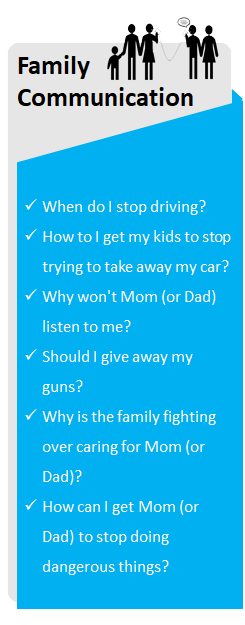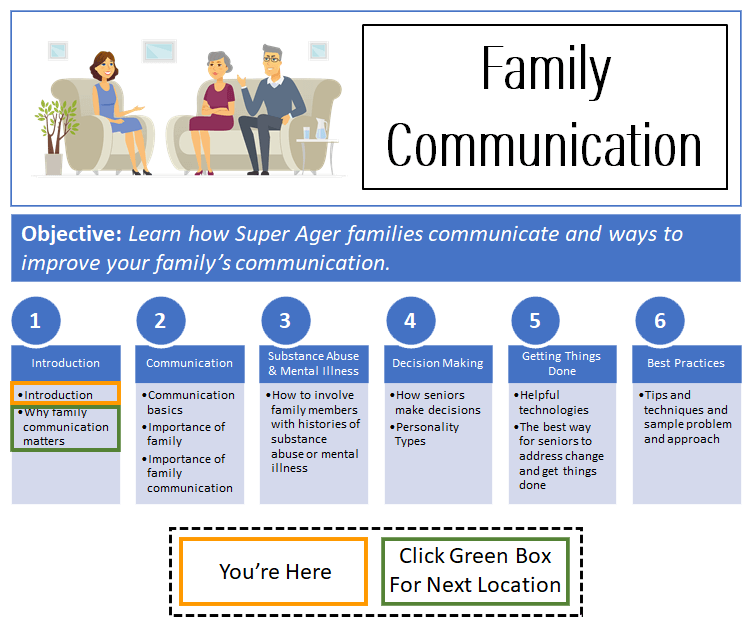Family Communication
Click here to see what's on this page.
Carmen and I will say this upfront, family communication is difficult. Families have radically different ways of getting along and communicating. Some are like master symphonies, where each member follows a designated maestro in perfect harmony. Some are like master jazz groups with each virtuoso riffing off one another without blocking out or taking over the melody. However, most are not.

Most families communicate like a really bad garage band. In ways only the members can truly appreciate and understand.
The single biggest problem in communication is the illusion that it has taken place.
George Bernard Shaw (credited)
Biggest Family Communication Challenges

Families are complex structures in their purest form. In addition, add a few divorces, remarriages, and affairs and the family can quickly metastasize into almost unrecognizable forms.
However, for Super Agers, the complexity or simplicity of their family did not matter. They approached family communication with a clear objective: “My life is my responsibility and I will communicate my wishes to my family when I’m relatively healthy, wealthy and wise.” They also understood how to effectively talk to different family members.
CarePlanIt’s Family Communication teaches you to do the same.
Family Communication Best Practices
CarePlanIt’s Family Communication program includes “best practices” and techniques for establishing a communication protocol for your family and techniques for the Ager to communicate at different levels of detail.
In other words, Family Communication is the master technique that helps a family better communicate throughout the end-of-life process. Toward the end of our lives, the primary players will be family and health providers. Therefore, the healthier we are, the more the family plays the major role. Even in situations where the senior spends years in a nursing home, it is the family members that will deal with the senior’s end-of-life issues.
Quick Tip:
Get through this period by staying as calm and rational as possible. Try and follow best practices. Use third-party recommendations (we recommend CarePlanIt) to help depersonalize the process of communication. Never actively try and “reconnect,” “bond,” “self-actualize” or “re-build” a relationship during this time. It may happen naturally, but it is much more likely the opposite will happen, especially if your expectations are unrealistic. During end of life periods, most of us have very unrealistic expectations.
CarePlanIt
CarePlanIt focuses on helping you get through an end-of-life experience. It’s a very stressful time in people’s lives. Even when you follow CarePlanIt’s best practices, those of Super Agers, it’s easy to encounter situations that have multiple solutions, none of which can make everyone happy.
A Short Illustrative Story
Situation
A beloved father, Jack, with four living children and remarried for over a decade, has passed.
Background
He helped raise his new wives three children. He left an estate capable of providing for his end-of-life issues, and all his children, biological and step. But left it up to his biological children and wife to select a location for a burial and service. Specifically, his will read, “I request that my wife, if alive, and any of my surviving biological children select my burial location.” He actually owned two plots, one with his current wife, and another in a cemetery where his parents, a sibling and deceased daughter were laid to rest. At the time of his will, he simply did not want to force a decision that would disappoint his wife or his biological children. In fact, it was his wife’s declining medical condition that led him to draft his last will. He also didn’t think his wife would survive him.
Challenge
Jack’s family was very traditional. Four generations had lived in the same community. They owned multiple commercial and residential properties. Jack’s family had been buried in the same cemetery for four generations. When Jack remarried a woman from another town, it naturally created issues. Jack’s wealth was derived from his family and its relationship to a town. But Jack’s current happiness was created by his wife. Jack’s family was always kind to Jack’s second wife, but she was not part of the town, it’s history, or Jack’s legacy. At least the legacy Jack’s family had in mind.
The one wish Jack’s wife had was to be buried with her husband. Jack’s family cemetery plots had an exclusion for second wives, unless the first had passed before the ensuing marriage. Legend had it that Jack’s family had put this covenant in place so the non-family members’ participation in dalliances could not find their way to the family’s eternal resting place.
Point Of The Story
The point of this story is simple: if you’ve led a rich and varied life with multiple marriages, even the most prepared Super Ager is likely to create situations that are hard, if not impossible, to solve in a way that makes everyone happy.
Some Agers seek to appease a certain group of people at the price of others. They are intentional in their actions.
If family harmony after you’ve passed is your objective, hiring a family or faith-based counselor to help address some of these challenges may make sense. Making an effort to account for everyone’s needs, even if they cannot all be met, shows you tried.
CarePlanIt’s Family Communication
CarePlanIt’s program is based on the five Master Techniques. Family Communication, as the name implies, focuses on communication among family. The family can be defined in many ways. For example, it can represent the nuclear family, parents, and children; an intergenerational family, nuclear family and the family of their parents; extended families created by multiple marriages and long-term relationships; and community families made up of close friends, neighbors, and nonprofessional caregivers.
Should I Quit My Job or Leave My Home To Care For A Parent?
Carmen and I conversations with Super Agers have taught us that the “best practice goal” for family communication during the “end of life” period is to survive the process. This includes:
There are reasons for this cautious approach.
Carmen and I debated the need to be cautious. A significant number of those we interviewed, about 35%, talked about a positive parental caregiving experience. They talked about bonding, seeing a different side, about learning something they had not previously known. Experiences that made them feel closer to their parents. Our initial thoughts were how could you expand and replicate this experience. We asked for the names of siblings and the children of the caregivers. What we discovered was generally a very different point of view. Not nearly as positive. But one involving family members feeling neglected, abandoned for another’s needs, and a sense that their needs and opinions did not matter. In other words, the caregiver that pursued parental caregiving at the expense of the needs of their nuclear family, was making serious sacrifices.
Don’t Quit Your Job
This knowledge allowed us to go back to discuss caregivers with positive experiences and ask how they thought those around them reacted. We didn’t divulge confidences, but we now knew more. What we were able to discover was a much narrower communication process. One where the primary caregiver, extolling the virtuous experience, had little interest in cooperatively working with other family members. Incredibly burdened, we found that the main caregiver believed they were not offered the help they needed, felt abandoned, and often resented the lack of understanding and support from other family members.
What Carmen and I found was that the above description was pretty common. In fact, it’s the average way things got done.
Survive To Thrive
There are two significant reasons why families should focus on survival versus a search for self-actualization. The first involves the myriad of issues that family members address. These issues have a variety of satisfactory answers. The problem is that it is rare all family members, children, the Ager, and spouse of the Ager are likely to agree. There are lots of disagreements. The other is trauma, which we discuss in it’s own section below.
Areas Where Family Tend To Disagree
Take a look at the issues below and ask yourself if you and your children would reach similar conclusions.
Every family has different ways of communicating. Histories, interfamily relationships, and current issues all impact how a family communicates. CarePlanIt gives you some techniques to make communication easier and more efficient. Overall, the key communication objective is to keep the family knowledgeable about an Ager’s status relative to the five Master Activities.
Seniors Are Responsible For Making Their Own Decisions
If you’re the senior, the buck stops here. With the Ager. At least initially. It’s our job as an Ager to start, complete and maintain as much of the five master techniques as possible.
Super Agers have always known this to be true. Super Agers generally have agreements with family members for help when they get injured. That help can come in many ways: from live-in support during the recovery period to financial support for a live-in caregiver. Even more important, the family knows about these agreements and their responsibilities and commitments.
Contentious Decision Areas Impacting Family Communication
Common concerns discussed among seniors and family members include:
Trauma & Decision Making
It is simply impossible to believe that an entire family, most notably the children of dying parents, has survived life without trauma. That they have traversed childhood, their teenage years, their marriage years and their parenting years free from extreme horror, pain or loss. Even if such a journey was made it is still less believable that they remain similarly untouched by the decline and death of their parent or parents.
Effective Communication Is Hard To Create In The Best of Times
Great communication involves skills, conditions, and environments that almost never exist during end-of-life periods. For example, the seven C’s of effective communication: completeness, conciseness, consideration, clarity, concreteness, courtesy, and correctness, work best in professional settings when people can be objective. They work worst in emotionally charged, volatile situations.
Families lean toward the volatile in the best situations. Families with trauma can be especially volatile. In general, you can think of trauma as a psychological or emotional response to an event or experience that is deeply distressing or disturbing. Trauma is caused by events that cause moderate to severe stress in the recipient or perceiver. The events cause the person to feel horror, helplessness, or to feel the threat of injury or death.
Here’s how trauma affects people
It’s categorized in a variety of developmental ways.
Cognitive
Emotional
Physical
Behavioral
Final Comments On Trauma Versus Survival
Even if we are healthy, the chances of everyone in our family being healthy is low. It’s also unlikely you know all that your siblings, and your sibling’s families are confronting with a high degree of accuracy. Challenges concerning finances, marriage, health, children, and substance abuse are incredibly common.
However, end-of-life issues are inflammatory at best, and crisis-producing at their worst. Getting through them, simply surviving them, is a valid objective. Addressing old wounds or expecting resolutions to lifelong issues is overly optimistic. If it happens, great. But pushing for these resolutions is more likely to pour fuel on emotions, already on fire.
Other Resources on Family Communication
Make sure to see our other sections, especially, Getting Things Done here, and Best Practices: Tips and Techniques, here.
Also, some basics on family communication can be found here.
